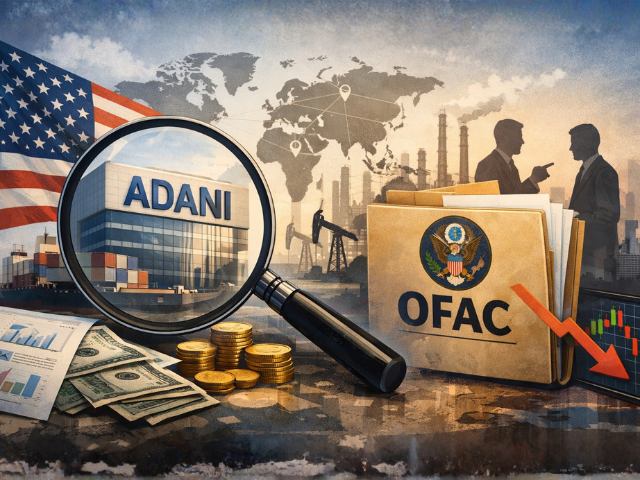


US OFAC Allegations on Adani Group: What the Request for Information Means for Investors
TL;DR
News around the Adani Group once again grabbed investor attention after reports that the US Office of Foreign Assets Control, commonly known as OFAC, sought information related to certain group entities. Headlines moved fast, social media reacted faster, and markets did what they usually do in such moments, price in uncertainty.
For investors, especially in India, it is important to pause and understand what an OFAC information request actually means and what it does not. Regulatory processes often involve preliminary fact finding, and not every request results in punitive action.
OFAC operates under the US Department of the Treasury and is primarily responsible for administering economic and trade sanctions. Its jurisdiction usually applies to US persons, entities operating in the US, or transactions involving the US financial system.
An OFAC request for information is essentially a formal query seeking clarification or documentation related to transactions, counterparties, or compliance processes. It does not automatically imply wrongdoing.
Such requests are often part of routine screening, enhanced due diligence, or third party reporting. Global conglomerates with international exposure frequently face these checks due to their scale, geographic reach, and involvement in cross border trade or financing.
For Indian investors, this distinction is critical. A request for information is not a sanction, not an indictment, and not a final regulatory conclusion.
The Adani Group has expanded aggressively across ports, power, renewables, airports, and infrastructure. Many of these businesses involve international lenders, suppliers, and contracts, bringing them within the visibility of overseas regulators.
Large infrastructure projects often require foreign currency borrowing, offshore subsidiaries, and global counterparties. This naturally increases regulatory touchpoints across jurisdictions, including the US financial system.
In past cases across global markets, similar regulatory inquiries have been seen with multinational corporations without necessarily leading to adverse outcomes.
Indian equity markets tend to react swiftly to global regulatory headlines, particularly when they involve prominent business groups. Following reports of the OFAC query, select Adani stocks witnessed intraday volatility as traders reassessed risk.
However, broader market indices remained relatively stable, indicating that investors viewed the development as company specific rather than systemic.
Domestic institutional investors and long term retail participants generally focus on cash flows, project execution, and regulatory clarity from Indian authorities such as SEBI and stock exchanges.
In India, listed companies operate under strict disclosure norms governed by SEBI and stock exchange regulations. Any material development that could impact investor decision making must be disclosed in a timely manner.
Indian regulators also maintain oversight on foreign exposure, related party transactions, and debt structures through periodic filings. This layered regulatory environment provides an added level of transparency for domestic investors.
From an investor protection standpoint, this ensures that information asymmetry is limited and market participants can make informed decisions.
For investors, the key lies in separating facts from speculation. Regulatory inquiries, especially from overseas agencies, often evolve over time. Markets dislike uncertainty, but they also correct exaggerated fears once clarity emerges.
Short term traders may witness heightened volatility, while long term investors may focus on fundamentals such as asset quality, revenue visibility, and balance sheet strength.
This episode also reinforces the importance of diversification and risk management, particularly when investing in large conglomerates with complex structures.
In times of regulatory headlines, access to credible research becomes invaluable. SEBI registered platforms like Swastika Investmart provide structured analysis, verified updates, and risk focused insights that help investors move beyond noise.
Strong research tools, responsive customer support, and tech enabled investing platforms allow investors to track developments objectively rather than reacting emotionally to headlines.
Investor education initiatives also play a role in helping market participants understand how global regulatory frameworks interact with Indian markets.
Regulatory scrutiny is not uncommon for global businesses operating across borders. While headlines can cause short term discomfort, long term investment decisions should rest on fundamentals, governance disclosures, and regulatory outcomes rather than speculation.
Staying informed through reliable sources and maintaining a disciplined approach remains the best defence against uncertainty driven volatility.
What is the US OFAC and what does it do
OFAC is a US Treasury body that enforces economic and trade sanctions and monitors compliance related to international transactions involving the US financial system.
Does an OFAC information request mean sanctions are coming
No, an information request is a preliminary step and does not automatically lead to sanctions or penalties.
Will this impact Indian stock markets broadly
Such developments are usually company specific and do not typically affect the broader Indian market unless systemic risks emerge.
Should retail investors exit Adani stocks immediately
Investment decisions should be based on individual risk tolerance, investment horizon, and fundamentals rather than short term news flow.
How can investors track verified updates on such developments
Following stock exchange disclosures, SEBI filings, and trusted research platforms helps investors stay informed with accurate information.
Regulatory inquiries can test market sentiment, but they also underline the importance of transparency and compliance in global business. For Indian investors, the focus should remain on verified disclosures, regulatory clarity, and long term business fundamentals.
If you are looking to navigate market volatility with confidence, having access to reliable research and a SEBI registered platform makes a meaningful difference.
Explore smarter investing and stay informed by opening an account with Swastika Investmart today.


Trust Our Expert Picks
for Your Investments!



